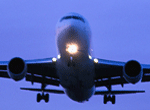Yesterday afternoon at about 14:20 CDT, United Continental Holdings suffered a “network outage” lasting about two hours that affected its reservation and online systems. At least 200 flights around the world were affected, United acknowledged. At one point, United requested that the U.S. Federal Aviation Administration place ground-stops “to prevent flights from taking off to some of its hub airports, including San Francisco, Newark and Houston,” the Chicago Sun-Times reported. United Continental Holdings is the parent of United Airlines and, since a May 2010 merger, Continental Airlines.
Per usual, there were long check-in lines as boarding passes had to be written out by hand and jammed reservation telephone lines as frustrated and often angry passengers tried to change their flights. United allowed, with some restrictions, those traveling yesterday to make changes without incurring a penalty once the system came back up.
United has been struggling to regain customer trust since it botched the introduction of its “new” integrated reservation system in early March. This outage won’t help. Many news articles today speak of how poorly United communicated with its passengers as being a special sore point.
Last year, United suffered a similar “network connectivity issue,” the cause of which it never explained, at least as far as I can find out. According to the Sun-Times, “United said its IT department is reviewing the cause of the outage, and said it could not comment on whether the integration of the [reservation] systems caused the problem.” Don’t hold your breath waiting for additional details.
When last year’s outage hit, before the reservation system merger, only United Airline’s passengers were affected. As I noted then, “once the two airlines computer systems are fully merged, any similar glitch will likely have increased flight and passenger consequences.” You would think that the “world’s largest airline” would have better network back-up capability, especially given the experience of last year.
In a bit of irony, the Wall Street Journal ran a story yesterday on how airlines are pushing hard to implement the completely “self-service airport” where passengers won’t see an airline representative until they are greeted by the flight attendant on their plane. The story talked about airlines like Alaskan and American, who are introducing self-tagging of baggage as well as JetBlue, which became the first U.S. airline to introduce self-boarding gates at MaCarran Airport at Las Vegas.
Air transport communications and information technology providers like SITA claim the move to self-service technology is, “more about throughput with the resources you have than getting rid of humans,” while the airlines say it is to allow them to give more attention to passengers with questions. Yeah, right. Just like what happened at banks when they introduced ATMs and online banking technologies.
Of course, I do suppose there are opportunities for employment for at least some number of airline workers being displaced by the self-service technology who could be retrained to help fix it when it inevitably breaks down.
Still, it will be interesting to see what happens when a self-service airline has a “network outage.” Have you been in a large supermarket when the checkout scanners stop working?
Update: 30 August 2012
Yesterday afternoon, United announced in an email to major news organizations that, "A piece of communication equipment in one of our data centers failed and disabled communications with our airports and website. We have fully redundant systems and we are working with the manufacturers to determine why the backup equipment did not work as it was supposed to."
The failure of backup IT systems to take over for a primary system that isn't working correctly has been a recurring theme this year in the Risk Factor, especially in the IT-related failures plaguing the world's stock exchanges.
What I found interesting about the United disclosure of the cause of its outage is how uncharacteristic it is. In the past, United has been very reticent to talk about any of its computer problems. One reason for the disclosure seems to be that United wanted to make it absolutely clear that the problem wasn't with its Shares reservation system and that its troubles were the result of something outside of its control. If it had been a reservation system issue, both passengers and investors would without a doubt have severely punished the airline's reputation, each in their own way.
In the end, 580 flights were delayed and 9 were canceled because of the two hour outage.
Robert N. Charette is a Contributing Editor to IEEE Spectrum and an acknowledged international authority on information technology and systems risk management. A self-described “risk ecologist,” he is interested in the intersections of business, political, technological, and societal risks. Charette is an award-winning author of multiple books and numerous articles on the subjects of risk management, project and program management, innovation, and entrepreneurship. A Life Senior Member of the IEEE, Charette was a recipient of the IEEE Computer Society’s Golden Core Award in 2008.



